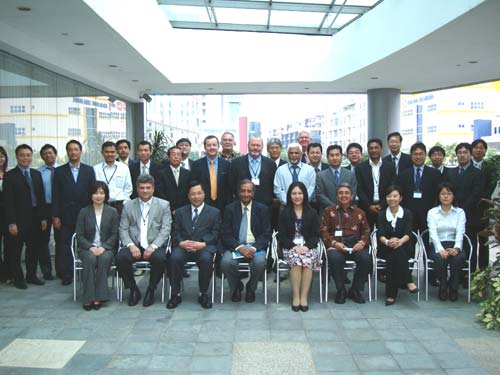![]() CAWater-Info / International organizations / The Asia-Pacific Water Forum
CAWater-Info / International organizations / The Asia-Pacific Water Forum
1st Annual Progress Review Meeting of APWF (Asia Pacific Water Forum) Knowledge Hubs
24 June 2009, Singapore
Just one year ago the APWF Knowledge Hubs Network was launched on 26 June 2008 in Singapore, with support of ADB and Singapore Water PUB. This network was created on the basis of 13 existing organizations located in different countries of the region, including the SIC ICWC which is registered as the Central Asia IWRM Resource Center (including also the ICWC Training Center and the ICWC Data-Computing Center). Now the following centers exist and function:
- Urban Water Management PUB WaterHub, Singapore;
- Disaster Risk Reduction and Flood Management ICHARM, Japan;
- Water and Climate Change Adaptation in Southeast Asia NAHRIM, Malaysia;
- River Basin Organizations and Management CRDOM, Indonesia;
- Water Quality Management in River Basins K-water, South Korea;
- Decision Support Systems for River Basin Management - Hydroinformatics CHIRB, Chine;
- Water Governance Institute of Water Policy, Singapore;
- Irrigation Service Reform IWMI, Sri-Lanka;
- Integrated Water Resources Management in Central Asia SIC ICWC, Uzbekistan;
- Integrated Water Resources Management in the Pacific Pacific IWRM Resource Centre, Fiji;
- Erosion and Sedimentation in River Basins IRTCES, China;
- Healthy Rivers and Aquatic Ecosystems IWC, Australia;
- Water Resources Management in Mountainous Areas ICIMOD, Nepal.
For more information about the APWF Knowledge Hubs, visit www.apwf-knowledgehubs.net
1st Annual Progress Review Meeting of APWF KnowledgeHubs was held on 24 June 2009 in Singapore.

Representatives of these centers presented the results of their activity during the last year and also discussed the most critical issues related to the network efficiency. The following items have been discussed at the meeting:
- Orientation onto the network clients, analysis of the interested participants and consumers, new approaches to the communications
- How to adapt the national knowledge bases to the regional level?
- How to ensure marketing of the knowledge centers in the Asia Pacific Region and at the global level?
- How to organize the control and coordination of the concurrent themes and experience in some sub-regions?
- What is the knowledge centers network value and how to estimate progress?
- Whether the self-repayment network strategy is needed and how to attract the donors?
- Whether there are new technologies for management improvement and knowledge dissemination?
At the second part of the meeting the new centers were accepted to the network and their business plans on the following themes were discussed:
- Transboundary Water Resources Management Mekong River Commission, Laos;
- Water and Climate Change Adaptation in South Asia Energy and Resources Institute, India;
- Groundwater Management IGES, Japan;
- Sanitation Institutions Consortium, Japan.
At the meeting it was underlined that the following priority themes, for which the candidates to maintain the network centers will be appointed in the near future, still havent been covered:
- Water Supply for Rural Areas and Small Towns;
- Water and Energy;
- Watershed Management.
ADB invited the UNESCO-IHE institute as the resource center in order to guarantee the network coordination. Its activity will be coordinated with the Network secretariat, which will be created in the near future at the ADB headquarters in Manila, Philippines.
Also for monitoring of the service quality the Supervisory Committee was created on the basis of secret voting and the following specialists were selected:
- Vadim Sokolov SIC ICWC, Uzbekistan
- Herat Mantritilake IWMI, Sri Lanka
- Peter Olivier International Water Centre, Australia.
The next coordination meeting will be held in Manila at the end of October 2009, together with the training seminar for managers of databases and the training centers representing the network centers. This seminar will be organized by UNESCO-IHE on the basis of analysis of those critical matters, which were discussed in Singapore.
